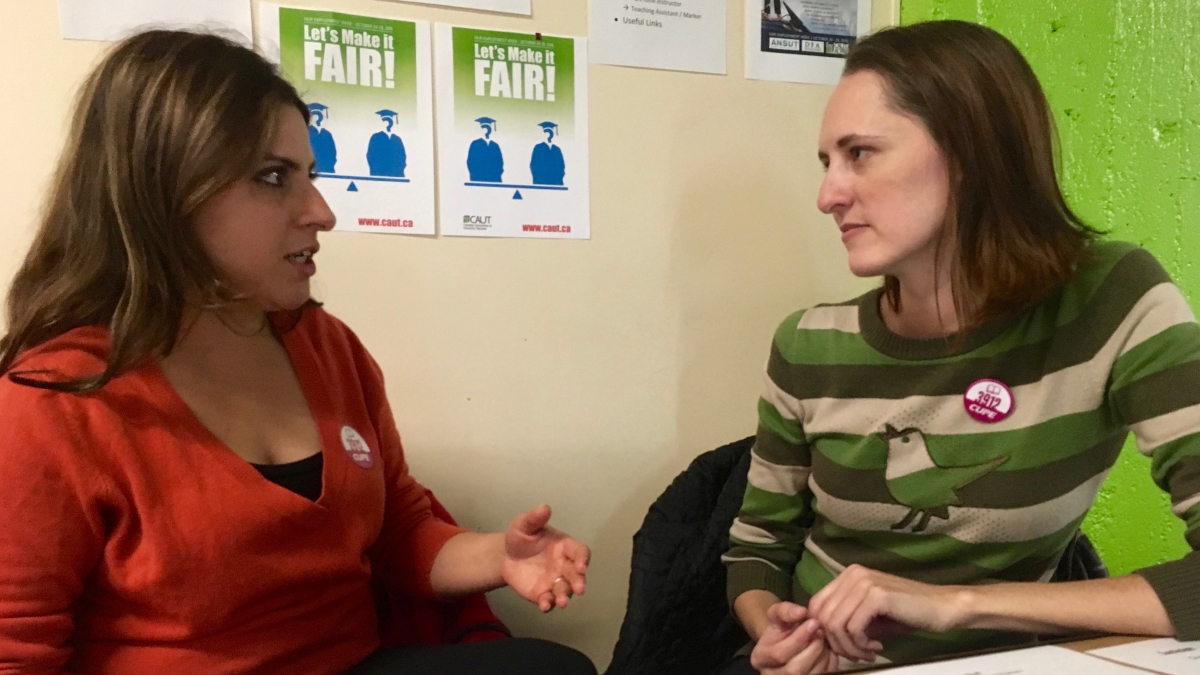Education
Fair Employment Week promotes equality for part-time instructors
'Over-worked, quite stressed, but being paid much less'

caption
Sara Lahsaee and Bonita Squires discuss their experiences as part-time instructors at Dalhousie.
caption
Sara Lahsaee and Bonita Squires discuss their experiences as part-time instructors at Dalhousie University.All over Canada, part-time instructors are looking to inform students and the public about the unequal treatment they face at universities.
Contract instructors are paid one-third less than regular professors, reports the Canadian Association of University Teachers.
The association is working to promote awareness of the use of contract staff in universities through an initiative called Fair Employment Week, which runs until Friday.
In Halifax, CAUT is partnering with the Canadian Union of Public Employees, Local 3912 to inform students that their instructors often face challenging employment conditions. CUPE 3912 represents part-time faculty at Dalhousie, Saint Mary’s and Mount Saint Vincent universities.
“People may be working just as hard on a particular course but they’re not being paid at the same level as someone with the same amount of teaching experience,” says Bonita Squires, a former part-time instructor at Dalhousie and a CUPE member.
A collective agreement between Dalhousie and its faculty association states that part-time staff will not teach more than 10 per cent of courses.
But of the more than 2,500 faculty employed at Dalhousie in the 2015-16 school year, nearly 690 were part-time academic staff members who worked less than 50 per cent of full-time hours. That is more than 27 per cent of Dalhousie faculty.
While the number of part-time academic staff that Dalhousie employs is high, many of these instructors do not teach the same course load as a full-time instructor. Because of this discrepancy, Dalhousie could not provide an estimate of what percentage of courses are taught by part-time staff.
Dalhousie is not unique in its numbers of part-time academic staff. In 2014, CBC reported that more than half of all undergraduate courses in Canada were taught by part-time instructors.
Squires, who taught an introductory speech-language pathology course last year, says the decreasing number of full-time positions means that these part-time instructors have to take on several jobs in order to make ends meet.
“Often people are taking several positions even across different universities. They’re running around trying to make it all work, and they end up being quite over-worked, quite stressed, but being paid much less than a full-time instructor,” says Squires
Sara Lahsaee, a recent PhD graduate in pathology, has had a similar experience. She is working three different positions, but altogether they only make up 17 to 20 hours per week.
Lahsaee says many recent science graduates are struggling to find full-time academic employment.
“They are too busy to even step out of the lab so they don’t communicate with lots of people, they see only a certain number of people every day for five or six years so it’s really hard to find sources and networks to branch out,” says Lahsaee.
Instructors and teaching assistants who can find employment continue to face difficulties.
Part-time instructors “are often looking for full-time employment and they can’t get it so they just keep taking contract after contract,” says Squires.
“There’s very little job security. You’re hired for one semester and then you don’t know if you’ll be hired for the next year or the next semester.”
Fair Employment Week’s next event in Halifax will be held at Saint Mary’s University tonight – a panel discussion called Precarious U.
